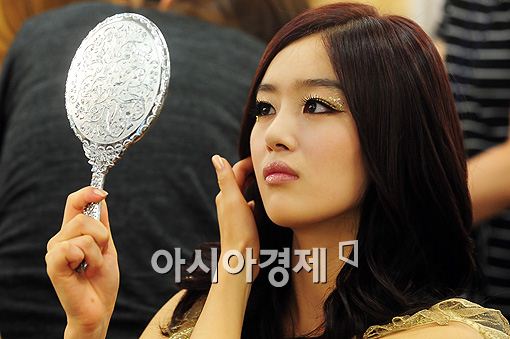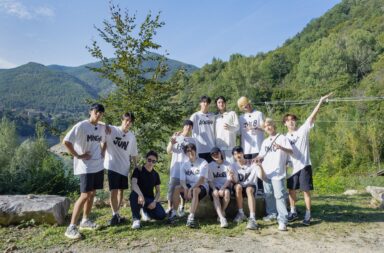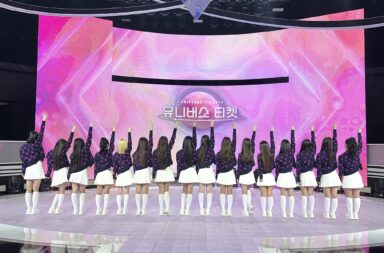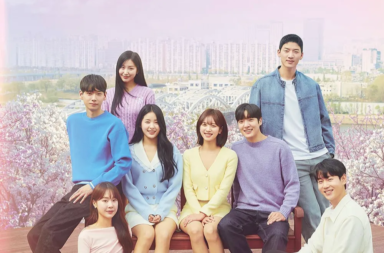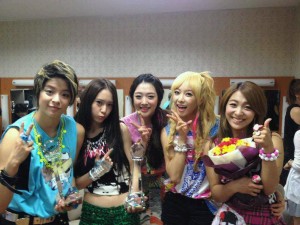 Competition and the competitive mindset are very evident in almost all forms of Korean pop culture. Rankings, surveys, and polls are treated very seriously among fans, with relative and comparative words such as “best, top, and greatest” being thrown around very often. While the trend of weekly awards seems to be fading judging by Inkigayo‘s recent decision to abolish its award system — a move Music Core did years prior — the awards are still treated fairly importantly by fans, idols, and companies alike. And despite kinks in their awarding system, yearly award shows are still very revered in the industry.
Competition and the competitive mindset are very evident in almost all forms of Korean pop culture. Rankings, surveys, and polls are treated very seriously among fans, with relative and comparative words such as “best, top, and greatest” being thrown around very often. While the trend of weekly awards seems to be fading judging by Inkigayo‘s recent decision to abolish its award system — a move Music Core did years prior — the awards are still treated fairly importantly by fans, idols, and companies alike. And despite kinks in their awarding system, yearly award shows are still very revered in the industry.
In K-variety, the importance of competition is very evident as well. Games are a very essential aspect of many variety shows, with shows such as Running Man and Let’s Go Dream Team (more or less) devoted to these games and competitions. There are also segments like Family Outing‘s bedtime arrangements and even shows like Infinite‘s Ranking King or SBS‘s Heroes where ranking plays a pivotal role.
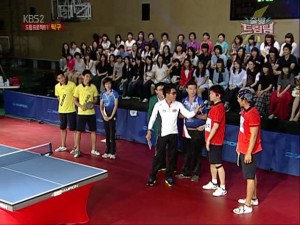 On-screen, competition is already evident in variety through segments and games, pressuring its participants to do well in them. However, off-screen, variety-participants — idols especially — also have something to else to compete for: screen time.
On-screen, competition is already evident in variety through segments and games, pressuring its participants to do well in them. However, off-screen, variety-participants — idols especially — also have something to else to compete for: screen time.
The term “screen time” is one that appears very frequently in complaints of K-pop fans when it comes to live performances and music videos. Whether one member gets too much or another not enough, screen time is a very controversial topic due to the blatant bias when handling it. Generally, those that are more visually appealing are the ones that are showcased in these videos or performances as they are the ones most likely to grab attention right away, even if they aren’t the most talented. But because of this, idols not as visually appealing are often put in the back, and there is little they can actually do to keep themselves from being overshadowed.
 In variety, while there is still bias towards more popular idols as they are the ones that bring in viewers, screen time is distributed a bit differently. Those that are amusing or funny are the ones that get the spotlight, giving more overshadowed idols time to shine. Airtime distribution in variety is a bit fairer and more changeable as those who work hard to break their limitations and grow out of their shells are the ones granted the time to shine. While this creates more opportunity, when there is more than one idol or guest present, this also creates a bit of competition.
In variety, while there is still bias towards more popular idols as they are the ones that bring in viewers, screen time is distributed a bit differently. Those that are amusing or funny are the ones that get the spotlight, giving more overshadowed idols time to shine. Airtime distribution in variety is a bit fairer and more changeable as those who work hard to break their limitations and grow out of their shells are the ones granted the time to shine. While this creates more opportunity, when there is more than one idol or guest present, this also creates a bit of competition.
Shows have restrictions to fulfill, and oftentimes, during recording, there is just too much footage and not enough time to show it all. As such, much of the footage is edited out during post-production, leaving only the more memorable moments and the necessities. Because of this, both cast members and guests need to stand out as much as they can in the time allotted, basically competing for time on screen.
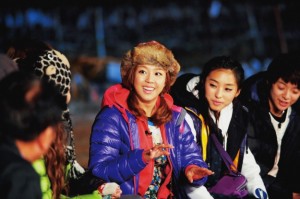 Idols especially have to worry their screen time as they use variety shows as means of promotions. Idols often make their variety appearances slightly before, during, or soon after their promotion times to keep themselves as circulated as possible in the entertainment scene. Promoting through variety isn’t as direct as promoting through a music program and actually showcasing material that can actually be sold. But keeping in mind that it’s often considered that idols themselves are products — meant to be and trained to be total packages, having looks, talent and personality – it’s still an effective way to further portray idols in a positive and more relatable light.
Idols especially have to worry their screen time as they use variety shows as means of promotions. Idols often make their variety appearances slightly before, during, or soon after their promotion times to keep themselves as circulated as possible in the entertainment scene. Promoting through variety isn’t as direct as promoting through a music program and actually showcasing material that can actually be sold. But keeping in mind that it’s often considered that idols themselves are products — meant to be and trained to be total packages, having looks, talent and personality – it’s still an effective way to further portray idols in a positive and more relatable light.
While variety is often used to show a more relatable side of idols to existing fans, through variety, idols can also expose themselves to an audience that may not be aware of them beforehand. If they manage to perform well and charm during the variety, they may attract new fans not in their usual demographic their usual promotions cover and broaden their fanbase.
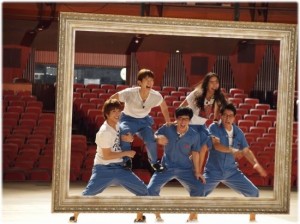 That being said however, this only applies if an idol does well in the variety he or she appears in. As fun as they may look, variety is still a business, and some companies go through a good amount of preparation to excel in this business. Some companies ask of their idols to prepare special skills or talents they can showcase on these shows, and idols prepare stories to tell and jokes to share beforehand.
That being said however, this only applies if an idol does well in the variety he or she appears in. As fun as they may look, variety is still a business, and some companies go through a good amount of preparation to excel in this business. Some companies ask of their idols to prepare special skills or talents they can showcase on these shows, and idols prepare stories to tell and jokes to share beforehand.
Unfortunately, not all idols can excel in variety, even with company interference. While some idols like MBLAQ‘s Lee Joon or Big Bang‘s Daesung are able to excel in variety by breaking their barriers and joking around, others cannot just pick up the pace right away. Some are just naturally more quiet and inclined to not contribute while others can’t seem to pick up proper timing without assistance. And then there are those idols who are unwilling to break their preconceived image. However, as awkward as some may be, they still need to promote themselves as idols. They need to grab attention to them in some way lest their appearance be bland and counterproductive, but the means of doing so can be a bit messy.
 In an effort to gain more screen time, one of the easiest ways idols can get attention is to take on characters. Characters basically exaggerate existing traits of an idol or entertainer, and are a gateway for consistent and attention grabbing variety. Previously the victim of constant editing, Secret’s Sunhwa had a hard time in her early days of Invincible Youth. As much as she tried and as much as she prepared, her idols peers easily overtook her. However, Sunhwa eventually gained prominence through her airhead-like character, an exaggeration for her occasional naiveté. The creation of this character allowed Sunhwa to create gags and situations that focused on her, finally getting the attention she desired.
In an effort to gain more screen time, one of the easiest ways idols can get attention is to take on characters. Characters basically exaggerate existing traits of an idol or entertainer, and are a gateway for consistent and attention grabbing variety. Previously the victim of constant editing, Secret’s Sunhwa had a hard time in her early days of Invincible Youth. As much as she tried and as much as she prepared, her idols peers easily overtook her. However, Sunhwa eventually gained prominence through her airhead-like character, an exaggeration for her occasional naiveté. The creation of this character allowed Sunhwa to create gags and situations that focused on her, finally getting the attention she desired.
But while characters or personas are pretty easy ways for idols to get attention, there are drawbacks to using them. As they are only exaggerations of an idol or entertainer’s personality, they are mistaken to be the behavior of the entertainer in real life which is simply not true. Following Invincible Youth’s finale, Sunhwa voiced her dissatisfaction of her airhead character multiple times as it didn’t always put her in a positive light.
 Another way for idols to set up situations for themselves is through love lines or through another sort of relationship with a cast member. The Monday Couple definitely helped then variety newbie Gary gain prominence and later confidence, and while Big Bang’s Daesung already has the outgoing personality perfect for variety, his Dumb and Dumber relationship with Yoo Jae-suk definitely help him hone his variety skills.
Another way for idols to set up situations for themselves is through love lines or through another sort of relationship with a cast member. The Monday Couple definitely helped then variety newbie Gary gain prominence and later confidence, and while Big Bang’s Daesung already has the outgoing personality perfect for variety, his Dumb and Dumber relationship with Yoo Jae-suk definitely help him hone his variety skills.
Again using Invincible Youth, T-ara‘s Hyomin was also another member that suffered from lack of attention as she was awkward in front of the camera, leaving her idol peers to outdo her. However, she soon paired up with more popular and more experienced Sunny of SNSD. Through this relationship, Hyomin was able to break out of her shell and grow with Sunny’s help, and their coupling provided some of the show’s more hilarious moments, definitely helping Hyomin in the long run.
On the minus side, love lines and cast relationships can only go too far before it becomes too scripted. The infamous Yoona and Taecyeon love line, which was used to distinguish the two from the more experienced gagmen, is often blamed to be one of the main causes of Family Outing 2’s failure, as it looked too scripted and had too much focus on it.
In the end of the day, as I said before, variety is still a part of an idol’s job. As fun as it may seem to be, like any other job, it requires lots of preparation, effort, and sacrifices that have to be made to get the job done. Variety is very beneficial to an idol, but for them to take advantage of these benefits, they need screen time first. But with limited time, for them to get screen time, idols need to work in a competitive, take-charge mindset, once again adding to the competitiveness that revolves around K-pop.
(KBS2, SBS, AsiaE)
